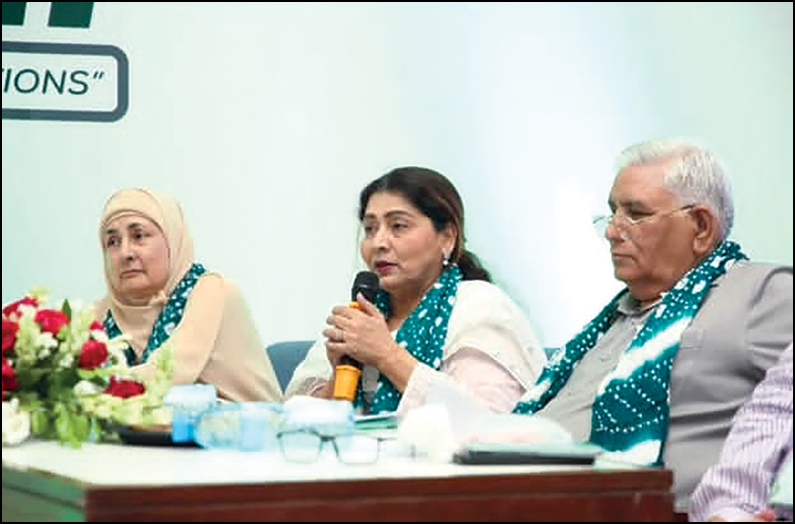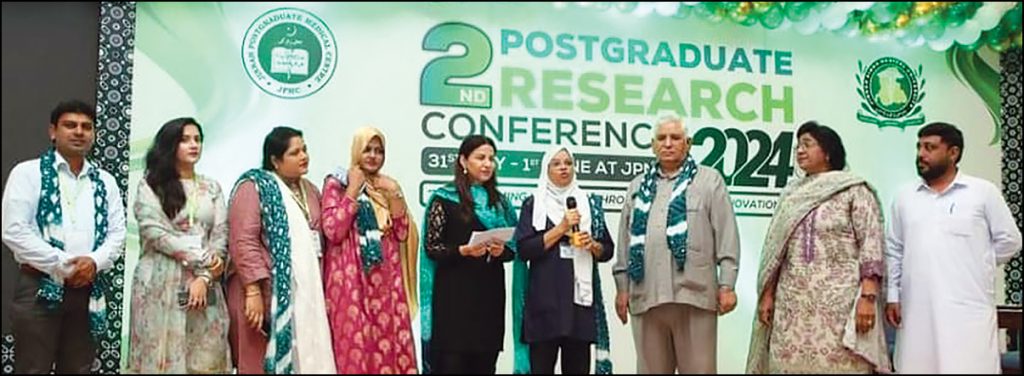JPMC Postgraduate Research Conference 2024
Practical steps need to be taken to promote research culture and scientific writing
Karachi: Jinnah Postgraduate Medical Centre in collaboration with Jinnah Sindh Medical University organized its Postgraduate Research Conference 2024 from May 31st to June 1st 2024. Prof. Nighat Shah was the chief organizer of the meeting. The Theme of the conference was “Transforming Research Through Digital Innovation”. On the first day Sindh Chief Minister Syed Murad Ali Shah was the Chief Guest. This session was also attended by Chairman of Sindh Higher Education Commission Prof. Tariq Rafi, Vice Chancellor of Jinnah Sindh Medical University Prof. Amjad Siraj, Pro VC Prof.Shahid Rasool, Vice Chancellor of Peoples University of Medical & Health Sciences for Women Nawabshah Prof. Gulshan Ali Memon. Dr. Masood Jawaid Director Medical Affairs at PharmEvo and Associate Editor of Pakistan Journal of Medical Sciences was the main speaker in the session dedicated to Artificial Intelligence who made his presentation on Role of Artificial Intelligence in Education and Research.

Dr. Rahat In charge Human Resource at JSMU(Centre) speaking at the session devoted to Scientific Fraud in Pakistan during the Postgraduate Research conference organized by JPMS on June 1st. Also sitting on the dais other members of the expert panel are Prof. Imrana and Mr. Shaukat Ali Jawaid.
On Second day there was a session devoted to Nursing Forum wherein the speakers included Mr. Samuel, Ms. Alafia and Ms. Aruna who made presentations related to Artificial Intelligence and Research. The next session was on Scientific Fraud in Pakistan. Dr. Ayesha Shahid Postgraduate Resident from Dept. of Obstetrics & Gynaecology Ward-9 was the speaker who shared some highlights of scientific fraud and retraction of papers by Pakistani authors. Dr. Shiraz from APPNA Institute of Public Health in his brief presentation also referred to this scientific misconduct and other unethical practices. Lack of time, Lack of dedicated funding and non-availability of facilities like internet he pointed out were some of the reasons the authors find it difficult to engage in meaningful research work. This was followed by panel discussion. Experts in the Panel included Mr. Shaukat Ali Jawaid Chief Editor of Pakistan Journal of Medical Sciences, Prof. Imrana from Jinnah Sindh Medical University, Dr. Rahat in charge Human Resource and CME at JSMU and Dr. Razzak Dogar.
Participating in the discussion Mr. Shaukat Ali Jawaid pointed out that it is high time that healthcare professional and medical institutions should set their priorities and ensure judicious use of the available resources to promote research culture and the art of scientific writing. For an institution like JPMC with a large number of postgraduates and young faculty members, a programme of monthly workshops on scientific writing should be prepared. Members of Pakistan Association of Medical Editors (PAME) are always ready to help medical institutions. Gift authorship is highly prevalent and this menace needs to be checked. Sale and purchase of authorship is widely promoted on social media. One person writes a paper puts the name of many others on the paper as authors by charging them heavy amount. It is not at all difficult to identify cases of gift authorship in most of the cases. We as a policy in Pakistan Journal of Medical Sciences do not allow more than four authors in single center studies. It is important for the editors as well as authors to follow the Internaitonal Committee of Medical Journal Editors (ICMJE) guidelines on authorship. Retractions and scientific misconduct indulged in by authors bring lot of bad name to Pakistan and we get lot of bad publicity in the International press as well.

JPMC in collaboration with JSMU organized the Postgraduate Research Conference 2024 from May 31st to June 1st. Photograph shows Mr. Shaukat Ali Jawaid alongwith Prof. Nighat Shah and others presenting prizes to the speakers in the Nursing Forum session as an encouragement.
Referring to the lack of funding, he said, in fact we misuse the available resources to a great extent. Medical profession must come back to the lecture halls and auditoriums of medical institutions from Banquet Halls of Five Star Hotels to organize all such academic activities which are always funded by the pharma trade and industry. The same funds can be used to fund research projects, scholarships and provision of other facilities.
He appreciated hosting the research conference at the campus of JPMC and pointed out that organizing such activities at medical institutions offers numerus advantages. It provides an academic environment, ensures easy participation by the healthcare professionals who are interested besides it reduces the expenditures to a great extent. On the other hand, participants in the scientific sessions at meetings organized at Five Star Hotels is very disappointing though it increases manifold at the time of lunch and dinner. Most of the postgraduates do attend mandatory workshops on Research Methodology organized by CPSP but unfortunately many do not learn much as regards scientific writing. Pharma industry is also fed up of the ever increasing demands for donations from the conference organizes but they keep quiet because they are in a vulnerable positon but they do not like it at all.
Prof. Imrana and Dr. Rahat also highlighted the importance of having regular workshops on scientific writing and providing guidance to the postgraduates besides help and assistance to them to engage in research. Dr. Razzak Dogar commended the initiative taken by the organizers to regularly organize research conferences. Mr. Shaukat Ali Jawaid remarked that postgraduates face lot of difficulties since the supervisors are too busy and have no time to guide and help them. He was of the view that one should be honest to the chosen profession and if some faculty members are too busy and have no time, they should not become Supervisors. Dr. Shiraz stated that one must learn time management and spare some time for research and scientific writing. If there is a will there is always a way.
Dr. Farah asked that it takes too long for publication of papers in good journals, how to reduce this publication time. Mr. Shaukat Ali Jawaid responded that we as editors are mindful of these problems and efforts are being made to increase the number of good quality peer reviewed journals published from Pakistan. It was in this background that PAME in collaboration with UHS started Certificate Course in Medical Editing in 2019. In the first two batches which are of six months’ duration, editors of biomedical journals published from Pakistan were enrolled. It was so helpful that most of these journals which are now edited by these trained editors have been recognized not only by HEC but also Pakistan Medical & Dental Council.
The number of journals which now enjoy Impact Factor from Pakistan has increased from three in 2019 to twelve in 2023 which is one of our accomplishments. We are aiming at increasing the number of Impact Factor Journals to over two dozen by the Year 2023 but it can only be realized if medical institutions, professional specialty organizations publishing these journals also take interest. So far five batches of CME have qualified and the 6th batch is under training. An Advance Course in Medical Editing has also been started which is also of six months’ duration. These courses have five assignments, portfolio preparation and viva examination as its components. In Advance course the second part consists of four days’ internship wherein the candidates spend one day at the offices of Journal of Pakistan Medical Association, one day at Journal of College of Physicians & Surgeons Pakistan and one day at the offices of Pakistan Journal of Medical Sciences.
Since they all have a different business model, they are briefed about the working of these journals which equip them to run and manage sustainable publication of any journal whether it is published by an institution, professional society or private medical publishers. Candidates after having completed both these courses will have to write a Research Report and they will get Diploma in Medical Journalism. It is important that journals have at least minimum essential staff including a Managing Editor and proper dedicated offices.
Publishing a journal is a full time job and it is not possible for the busy faculty members to do justice though they can supervise and monitor the working of the staff. Mr. Samuel requested that nursing staff must also be included in these training workshops as we are also keen to engage in research work. Mr. Shaukat Ali Jawaid offered the services of PAME members in organizing workshops, we will be too glad to help but there must be a proper invitation and the participants should also be interested.
The next session was devoted to Robotic Surgery, Problems and issues faced and the way forward. One of the residents made a presentation and shared the details of robotic surgery performed most of which consisted of removal of gallbladders, cholecystectomies. The experts panel consisted of Dr. Sadam, Dr. Zahid, Surindre and Dr. Shafqat. The issue of learning curve, complications and cost effectiveness were discussed in detail. Prof. Nighat Shah opined that Robotic Procedures with lot of disposables used were highly costly so much so that even an institution like Aga Khan University does not use Robots for such routine surgeries. We are not against this new technology but we have to make it sustainable as the government faced with lot of financial problems will not be able to afford funding for this in the coming years.
It should not be totally free and patients must pay or the institutions should generate their own funding for such procedures. She further stated that for a country like Pakistan, we need to focus on other priorities like primary health care and other medical emergencies for which she got lot of support from the participants. Mr. Shaukat Ali Jawaid remarked that the first Robot was installed at Qatar Hospital and it soon became dysfunctional. It is important to do audit, find out how many robotic procedures were performed there with this costly equipment and how much did it cost to the government. Another session was scheduled on Artificial Intelligence and Digitalization in Research.
On the whole there was lot of enthusiasm but quality of the presentations needs to be improved. The organizes will be well advised to give some topic to postgraduates who should identify a problem and then undertake research to find an indigenous cost effective solution. Then they should be asked to make the presentation. The organizers should also organize workshops on How to prepare slides, how to make posters and how to make a presentation for the postgraduates and young faculty members.



